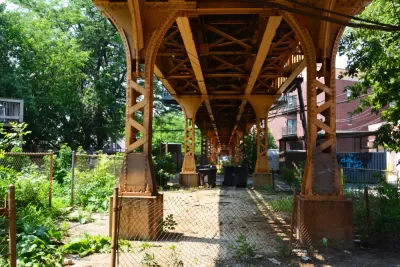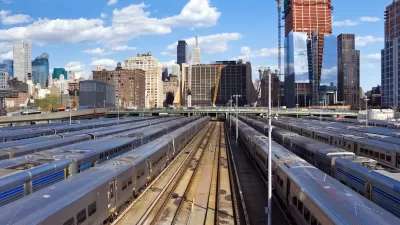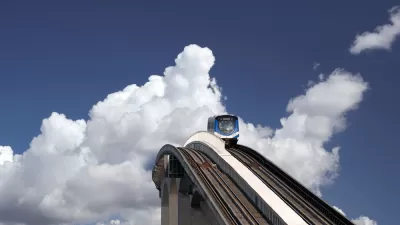Chicago's Logan Square neighborhood is the scene for a very contemporary land use policy debate: how much affordable housing can cultivated from the development opportunities in proximity to transit lines?

A rally to support affordable housing and protest high rents attracted 300 people to Emmett Street near the Logan Square Blue Line station in Chicago recently, reports Mary Wisniewski.
"The march and the proposed development are signs of growing urgency in the fight for affordable housing in the city, particularly near transit lines, community advocates say," according to Wisniewski.
The city of Chicago has policies in place intended to spur transit oriented development and create new affordable units along with new market rate units. Wisniewski explains:
Under city ordinance, developers of multistory transit-oriented development projects can offer little or no parking and obtain zoning for larger buildings, but the projects must be located within a quarter mile of a transit station, or within a half a mile of a transit station on a pedestrian-friendly street. The city expanded transit-oriented development zones three years ago and is now looking to expand them further along high-frequency bus corridors.
Here Wisniewski sums up the position of affordable housing advocates regarding the gentrification and displacement:
But transit-oriented developments tend to have high rents, with 10 percent of units in projects of 10 units or more reserved for affordable housing. Ironically, developments intended to promote transit may be helping to increase average rents in already gentrifying neighborhoods, forcing lower-income people to less convenient city neighborhoods or to suburbs, where they are more dependent on cars. Some community advocates are asking the city to allot higher percentages of housing for low-income people.
The article includes more of the political debate on the subjects of affordable housing, gentrification, and transit oriented development, and lists some of the policy agenda of affordable housing advocates like those who participated in the rally in Logan Square.
FULL STORY: Fight for affordable housing near transit lines takes on new urgency

Planetizen Federal Action Tracker
A weekly monitor of how Trump’s orders and actions are impacting planners and planning in America.

Maui's Vacation Rental Debate Turns Ugly
Verbal attacks, misinformation campaigns and fistfights plague a high-stakes debate to convert thousands of vacation rentals into long-term housing.

Restaurant Patios Were a Pandemic Win — Why Were They so Hard to Keep?
Social distancing requirements and changes in travel patterns prompted cities to pilot new uses for street and sidewalk space. Then it got complicated.

In California Battle of Housing vs. Environment, Housing Just Won
A new state law significantly limits the power of CEQA, an environmental review law that served as a powerful tool for blocking new development.

Boulder Eliminates Parking Minimums Citywide
Officials estimate the cost of building a single underground parking space at up to $100,000.

Orange County, Florida Adopts Largest US “Sprawl Repair” Code
The ‘Orange Code’ seeks to rectify decades of sprawl-inducing, car-oriented development.
Urban Design for Planners 1: Software Tools
This six-course series explores essential urban design concepts using open source software and equips planners with the tools they need to participate fully in the urban design process.
Planning for Universal Design
Learn the tools for implementing Universal Design in planning regulations.
Heyer Gruel & Associates PA
JM Goldson LLC
Custer County Colorado
City of Camden Redevelopment Agency
City of Astoria
Transportation Research & Education Center (TREC) at Portland State University
Jefferson Parish Government
Camden Redevelopment Agency
City of Claremont





























